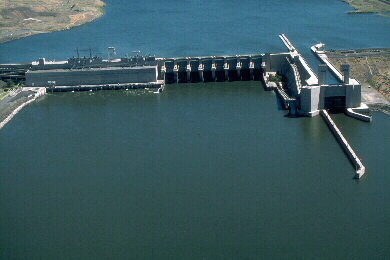forum
library
tutorial
contact

Governor Supports Breaching Four Dams
by Lance RobertsonRegister-Guard, February 19, 2000
|
the film forum library tutorial contact |

|
Governor Supports Breaching Four Damsby Lance RobertsonRegister-Guard, February 19, 2000 |
Snake River: Kitzhaber is the first major Northwest leader to take such a stand in the name of salmon recovery
 Oregon Gov. John Kitzhaber on Friday endorsed breaching four dams on the lower Snake River as the most responsible" option for saving Columbia River Basin salmon from extinction.
Oregon Gov. John Kitzhaber on Friday endorsed breaching four dams on the lower Snake River as the most responsible" option for saving Columbia River Basin salmon from extinction.
In a speech to the American Fisheries Society in Eugene, Kitzhaber acknowledged that breaching the dams "is not a silver bullet" that by itself will save the salmon. But he said "we have to stop deluding ourselves into believing that our choices will be easier and cheaper if we just leave the dams alone."
The governor said he favors dam breaching as part of an over-all strategy for saving salmon that includes restoring degraded habitat, changing hatchery operations, limiting fish harvest levels and altering the way the hydroelectric system is operated in the Columbia Basin.
There is "no doubt" the region can move ahead with salmon-recovery efforts without breaching the dams by being more aggressive in taking those other actions, he said.
He said the best way to save salmon, however, is to "build a recovery strategy that includes breaching the four Lower Snake River dams. Breaching emerges as a responsible and cost-effective option."
Kitzhaber became the first major elected official in the Pacific Northwest to support the politically controversial notion of removing the earthen portions of Ice Harbor, Lower Monumental, Little Goose and Lower Granite dams in Southeastern Washington.
The breachings would allow the Snake River to flow freely in its 140-mile stretch from Lewiston, Idaho, to where the Snake River joins the Columbia River near Pasco, Wash.
Federal agencies are considering whether to recommend the dam breaching to Congress as part of an overall program to help restore the Columbia Basin salmon.
Twenty six salmon and steelhead runs in the Columbia River and along the west Coast are protected under the US Endangered Species Act because their numbers have fallen from millions at the turn of the century to about 5 percent to 10 percent of that historic level.
Dams, logging, mining, grazing, pesticide use, overfishing, urban development and natural ocean conditions are the major causes of the decline. Juvenile salmon get chewed up in the dams' turbines as they head downstream on their way to the ocean.
The runs have declined despite more than $3 billion spent on projects such as fish ladders, hatcheries and a truck and barging system to move the young fish around the dams.
Kitzhaber's endorsement of breaching the dams came after the fisheries society unanimously approved a resolution Thursday calling for such action.
Fisheries biologist in Eugene hailed the governor's speech, giving him a standing ovation as he completed his 30 minute talk.
"It's about time we had a politician who understands the science and is willing to take such a strong stand," said Jim Martin, a former fish policy adviser to Kitzhaber who is now an advocate for an organization called For the Sake of the Salmon. "This group of scientists has been waiting a long time for a politician with the courage to take this kind of stand."
Martin acknowledged that Kitzhaber is virtually alone on the issue among Northwest politicians, but said "someone's leadership is not judged by how many people agree with you at the start, but by how many people agree with you at the end."
Environmentalists and tribal leaders also praised Kitzhaber.
"The governor is simple recognizing the reality that every other option is going to lead to extinction or cost far more than breaching the four Snake River dams," said Glen Spain, spokesman in Eugene for a coalition of commercial fishermen along the West Coast.
But other prominent politicians and representatives of Columbia River irrigators, grain farmers and shipping companies denounced Kitzhaber's dam-breaching endorsement. They contend that the region can't afford to lose some of its hydroelectric power generation, water for irrigation, and an inexpensive way to transport goods all the way to Lewiston.
The four dams generate about 5 percent of the electric power sold by the Bonneville Power Administration, the federal power-marketing agency.
"If the governor is telling us that he wants to turn off our lights, he must also tell us how he intends to turn them back on," said Sen. Gordon Smith, R-Ore. Smith said breaching the dams "would harm countless Oregonians."
He said taking out the four lower Snake dams would create momentum for removing other dams, creating a kind of domino effect that would wreak economic hardships throughout the region.
Bruce Lovelin, spokesman for the Columbia River Alliance, a coalition of farmers, river users, aluminum companies and others, said "the bottom line is, we're not going to breach the four dams. It basically is an impractical solution."
Sen. Slade Gorton, R-Wash., has vowed to prevent the breaching. And Lovelin said it's unlikely Congress would approve decommissioning the dams and authorizing "hundreds of millions of dollars" to cut a notch in each one.
Kitzhaber said he wants to remove the "symbolism" the dam breaching issue has assumed among interest groups and the media so the region can focus on the other remedies for saving salmon.
He denounced the "guiltless complacency" that has allowed the salmon "to drift toward extinction. . . Now is the time to act," he said. "The salmon can't wait. The people can't wait."
learn more on topics covered in the film
see the video
read the script
learn the songs
discussion forum
